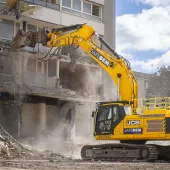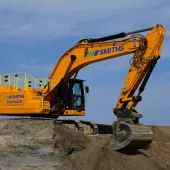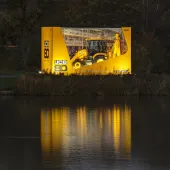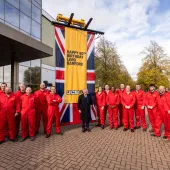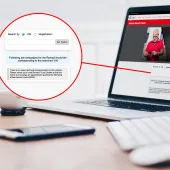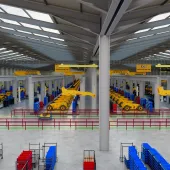Increasing safety and productivity in mobile equipment

David Banks, sales manager – waste & recycling sector at JCB, outlines some of the innovative vehicle design features that can help improve productivity and safety
WHILE speed, efficiency, output and value for money are essential for any operation – none of these factors should ever trump safety. It is this unflinching focus on safety across all areas of industry that has resulted in a significant fall in the rate of workplace accidents over the last ten years.
But as industries evolve – so too will risk – thereby the focus on safety should continue to be unrelenting. As Martin Temple, chair of the Health and Safety Executive (HSE), said: ‘Britain has one of the best health and safety systems in the world, but we should always be looking to improve and to prevent incidents that cost lives.’
Driven by the push for more recycling and reduced landfill, the waste and recycling industry is one of the fastest evolving sectors and remains one of the most hazardous in which to work and visit.
Implementing safe practice, according to the HSE guidance within waste and recycling sites, is vital. In addition, given that large vehicles move around increasingly busy waste and recycling sites, pose one of the greatest safety hazards. A significant step to mitigating accident risk can be taken by selecting vehicles (eg telehandlers, lift trucks, loading shovels etc.) that have been designed with safety in mind.
In fact with innovative design, features that improve safety can also boost productivity. The JCB Teletruk is one example; and thanks to the forward-reach ability of its telescopic boom, the machine can load and offload pallets of recycled items from just one side of a trailer – unlike a traditional masted forklift. Eliminating the need to travel to both sides of a lorry will significantly reduce the risk of an accident, as well as saving loading/unloading time and 50% of yard space.
Numerous safety features can be found on in a wide range of vehicles commonly operated by waste-management and recycling firms. Here are some key tips to selecting a vehicle with safety in mind.
- Operator Visibility - The vehicle’s cab should offer all round visibility for the operator and a clear view of the vehicle’s extremities. A panoramic front screen and a large roof screen will help. These features are made possible thanks to the use of direct glazing, which absorbs some of the torsional body loadings, thus increasing rigidity and strength. Sufficient demisting vents and mirrors should be positioned so that they are unobscured by the cabin’s pillars or bonnet. Heated mirrors will also clear condensation quickly to allow the vehicle to become operational without delay.
- Vehicle Visibility - Features that improve a vehicle’s visibility include high-visibility chevrons, presence beacons, flashing rear beacons and a rear detection system. These will help make people aware of the vehicle’s location at all times. In addition, a reversing alarm will alert bystanders to vehicle movements at all times.
- Access - There is a double edge to access when it comes to safety – on one hand, an operator should be able to access a vehicle without hazard. This will require several points of contact for entering/exiting the machine with evenly spaced access steps that are purposely inclined to ensure safe passage. On the other hand, unwarranted access to the machine’s hazardous areas should be prevented. Take for example the JCB 457 wheel loader, which has red and white chevrons at the rear and gated entry to an electronically operated one-piece engine compartment located safely at ground level. This configuration means operators need not access the top area of the machine, where there is a risk of slipping or falling, especially in icy or wet weather conditions.
- Operator comfort - Because waste and recycling vehicles generally operate long shifts, it is crucial for an operator to be comfortable so they are better able to focus on the task in hand. Cab design should cater for a variety of shapes and sizes of operator. Isolator mounted cabs with reduced vibrations and noise reduction are beneficial. An ergonomic cab will allow the operator to intuitively see and reach the controls and operate with minimal effort. Over the course of a shift, these features will minimize fatigue and any consequential drop in concentration.
- Operator protection - Meeting the ROPS and FOPS (Roll-Over and Falling-Over Protection Regulations) is, of course, essential. A roll-over protection structure will provide complete assurance should the unthinkable happen. Dust is common on waste and recycling sites – sometimes it can be harmful. Cabs that are positively pressurized against dust will ensure the driver has clean air. Large filters will be harder to block and will ensure constant airflow.
- Lighting - Front and rear work lights provide good all-round illumination, while LED lights allow ultimate productivity and safety in the dark. Where the vehicle has a rear hitch, which the JCB 560-80 Wastemaster telehandler is equipped with, a work light will offer safe and efficient operation.
- Technology - There are numerous technological developments that can enhance vehicle safety. For example, adaptive load control technology has been designed to automatically control hydraulic operation, helping to maintain vehicle stability. Hose burst check valves protect the rams from collapse in the event of a hose failure, while an interlocking seatbelt prevents an operator starting the machine until the seatbelt is fastened. In addition, telematics provide information and performance monitoring; allowing fleet managers and owners to have remote access to real-time machine working data, including operating hours and fault codes. Automotive style power brakes are known to offer proportional braking throughout pedal travel, deliver improved braking and provide safe stopping.



